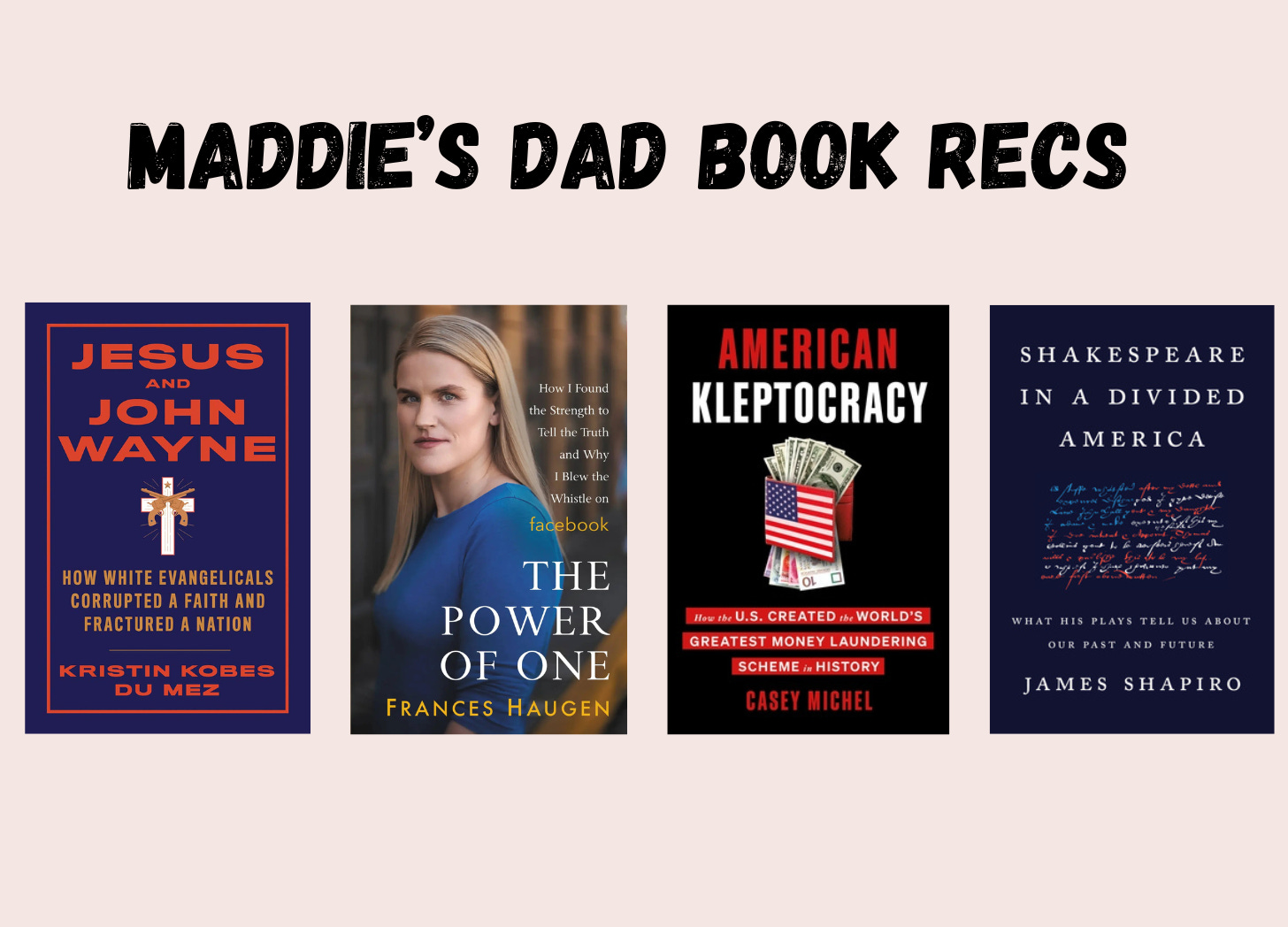My Journey Into Dad Books
American Kleptocracy, Jesus & John Wayne, and other non-fiction only a dad could love
So far, 2025 has been my year of audiobooks. I’ve lightly dabbled in them before, but this year I found my stride and narrowed down the genre I like most to listen to: non-fiction books that your dad likes. (Sorry to anyone who thought this post was about romance novels featuring dads. I get it, it really could have gone either way.) I would never pick up any of these books to actually read because, let’s be real, they’re a snooze fest, but damn do I love listening to a man explain the diary entries of John Quincy Adams on my morning commute. Is this the truest sign of being in my 30’s? I suddenly thirst for knowledge of the financial markets and 19th century American history?
To be fair, I’ve also read non-fiction that would appeal to fewer fathers (I’m looking at you, Cher: The Memoir), but I’m excited about finding my way into the rather opaque genre of dad books. Whether I’m walking to the bus, baking a cake, cleaning my apartment, or grocery shopping, somehow these monotonous chores are made less monotonous by more monotonous content. Is this what Sheryl Sandberg meant by lean in?
Anyway, enough of my self-congratulatory musings about becoming someone who actually reads about the history of evangelical christian nationalism. Here are a few of my favorite dad books I’ve read so far in 2025, in case you too would like to get in touch with your inner dad:
Shakespeare in a Divided America: What His Plays Tell Us about Our Past and Future by James Shapiro - America has always been obsessed with Shakespeare, no matter where you are in the country or what side of the aisle. This book follows the way Americans of all kinds (the public, politicians, presidents, rebels) have engaged with Shakespeare and how he’s shaped some of the United States’ defining moments. From Lincoln’s assassination at the hands of a Shakespearean actor to the rise in productions of The Tempest when immigration emerged as a hotly contested issue, Shapiro offers concrete evidence of this ongoing relationship throughout history. At the Hands Off rally a few weekends ago, I even heard a couple debate which Shakespeare play best represents our current moment, so clearly we’re still looking to the bard for answers.
American Kleptocracy: How the US Created the World’s Greatest Money Laundering Scheme in History by Casey Michel - Are you interested in the history of the LLC? Want to understand why Trump is really into Russia? Curious about how South Dakota has become a global capitol for dictators and despots to hide their millions? I wasn’t either, but this ended up being pretty interesting! The author does a good job of explaining complex financial instruments in plain terms and he places it within a narrative storyline following one of the most outlandish money launderers, which helped me understand how these legal loopholes really get used. It moves quickly and has been valuable context to a lot of financial policy decisions being made by this administration.
The Power of One: How I Found the Strength to Tell the Truth and Why I Blew the Whistle on Facebook by Frances Haugen - If you’re looking for a peek behind the curtain of Meta’s business model and operational processes, I highly recommend this memoir by the Facebook whistleblower, Frances Haugen. While I was interested in Haugen’s personal journey to Facebook and beyond, what struck me most was how technical this memoir became about the mechanisms that she worked on, the exact decision points where the company prioritized profit over human rights, and how the culture and structure of the company kept employees from making change. It’s a juicy tell-all in the nerdiest way and is a must-read for anyone working in social media.
Jesus and John Wayne: How White Evangelicals Corrupted a Faith and Fractured a Nation by Kristin Kobes Du Mez - Since the election I’ve been on a mission to read more about conservative ideology in hopes of understanding where so many Americans are coming from with their support of Trump. This book was one of the first I read and it helped put into historical context the perplexing rise of Trump amongst traditional christian Americans. Like many of us, I was frustrated and confused at conservative christians voting for Trump, but after learning more about white evangelical christianity, the real motives became clear: defend traditional gender roles, uplift American military might, and support an emblem of white masculine power that will defend a Christian America (even if he doesn’t exemplify it). This book covers a lot of history and was a little meandering at times, but I still found it accessible and interesting and highly recommend, if you’re on a similar reading journey.

